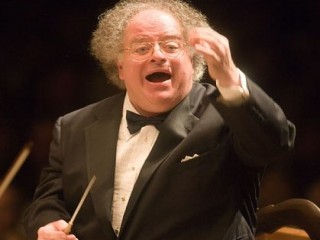
James Levine biography
Date of birth : 1943-06-23
Date of death : -
Birthplace : Cincinnati, Ohio, U.S.
Nationality : American
Category : Arts and Entertainment
Last modified : 2011-07-15
Credited as : Conductor, pianist, Metropolitan Opera
James Levine was born in Cincinnati, Ohio, into a musical family. A prodigy, he made his debut as a pianist performing Mendelssohn's Second Piano Concerto with the Cincinnati Symphony Orchestra when he was ten years old. At the age of 13 he studied piano with Rudolf Serkin at the Marlboro Music Festival. The festival needed someone to conduct the offstage chorus for a production of Mozart's opera Cosi fan tutte. Levine took the position and enjoyed it so much that he began to think of a career as a conductor.
He also spent summers in his childhood at the Aspen Music School and Festival where he studied with Walter Levin, violinist with the La Salle Quartet. He continued to study privately at home in Cincinnati and, through special arrangements, was able to devote afternoons to music studies and still complete a normal high school education. In 1961 he enrolled at Juilliard and was found to be so advanced that he was placed directly in the graduate program, in which he studied conducting with Jean Morel and piano with Rosina Lhevinne. During this time, he also studied with Rudolf Serkin, Alfred Wallenstein, Max Rudolf, and Fausto Cleva.
In 1962 he conducted Bizet's opera The Pearl Fishers at Aspen. When Levine was 20, George Szell, one of the world's foremost conductors, asked him to be assistant conductor of the Cleveland Orchestra, the youngest musician to hold such a post. From 1964 to 1970, he attended George Szell's rehearsals, concerts, and recording sessions and himself rehearsed and conducted under Szell's watchful eye. During this time he was also music director of the University Circle Orchestra and chairman of the Cleveland Institute's Department of Orchestral Training. He continued to appear at the Aspen Music School and Festival, now as a teacher as well as a conductor. He managed to perform the same activities for the Detroit Symphony Orchestra's summer festival, Meadow Brook. In addition to all these commitments he also worked at Oakland University.
In 1971 he conducted both Luisa Miller and Tosca at the Metropolitan Opera and was named its principal conductor—a post created for him; he was named music director of the Met in 1976; and in 1986 he was chosen the company's first artistic director. He also began his prolific recording career at this time, conducting operas by Verdi and Bellini.
Levine put his stamp upon the Metropolitan Opera. He managed to spend eight months a year there despite his hectic schedule, expanding its repertoire and developing its production values. He made numerous additions from the canon of modern opera, including Lulu, The Rise and Fall of the City of Mahagonny, Billy Budd, and Porgy and Bess.
Levine revived Lohengrin, Tannhäuser, and Der fliegende Hollander, and he began a Mozart cycle which added Idomeneo and La Clemenza di Tito to the Met's Mozart repertoire. He also presented uncut versions of Parsifal, Die Meistersinger von Nurnberg, La Forza del Destino, and Don Carlos, a reflection of his strongly held view that the composer's work is to be presented as he—not some subsequent, lesser musical light—envisioned it.
Although prolific in his studio recordings, Levine believed in live recordings and perceived the value of recordings to be their documentation of the style and the performances of an era. To this end, he moved beyond the traditional Saturday radio broadcasts of the Metropolitan Opera to create the "Live from the Met" television opera series in 1977. These programs, presenting complete, subtitled versions of actual performances and using increasingly sophisticated camera techniques, brought live operas into the homes of the largest potential audience in history. This series included La Boheme, The Rise and Fall of the City of Mahagonny, Tosca, Faust, and a variety of other works. He also initiated the annual revue of orchastral programs with soloists. In 1983 James Levine was the subject of a Time magazine cover story which claimed him to be America's leading maestro. The next year, he was named Musician of the Year by Musical America and was the first recipient of New York City's annual Cultural Award.
Levine conducted on tours with the Met orchestra throughout the United States, Canada, Europe, and Japan. In addition, he was a regular guest with the Philharmonic Orchestra, the Boston Symphony Orchestra, the Berlin, Munich and Vienna Philharmonics, and the Bayreuth Festival in Germany. He also had the honor of conducting in Frankfurt on that city's 1200th anniversary in 1990.
In 1996 James Levine celebrated 25 years with the Metropolitan Opera with an eight-hour performance on April 27th, broadcast over television. Excerpts from 43 operas, along with many of the most gifted performers such as Placido Domingo, Birget Nielsson, and Kiri Te Kanawa, were featured. Bernard Holland of the New York Times wrote, "What everyone seemed to share was a deep respect for Mr. Levine's ability. In opera conducting, no one accompanies better than him. … It is hard to recognize legends while they are still among us, but rest assured Mr. Levin will be one." In a documentary film about his career, James Levine: A Life in Music, the conductor stated, "I sometimes say that music chose me, the more I felt I just wanted to be immersed in it and the more it answered all my needs."
















